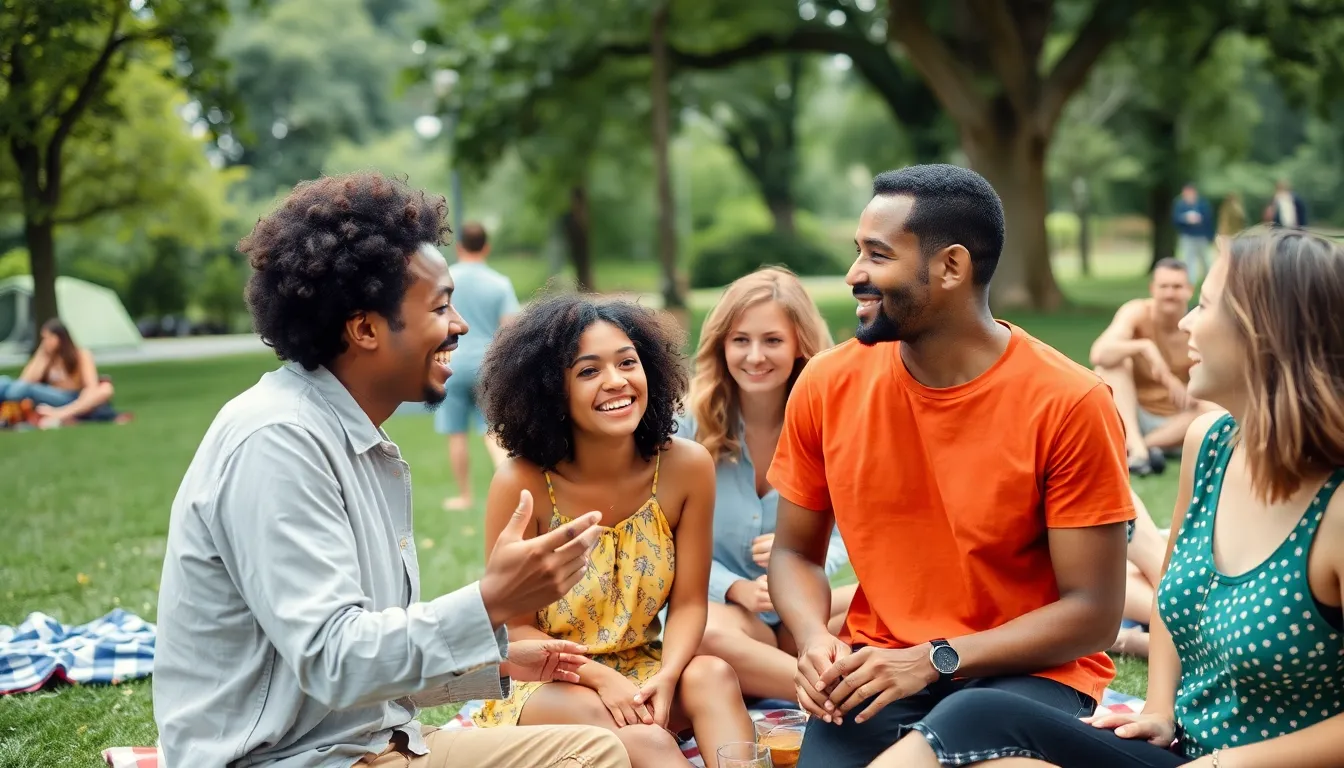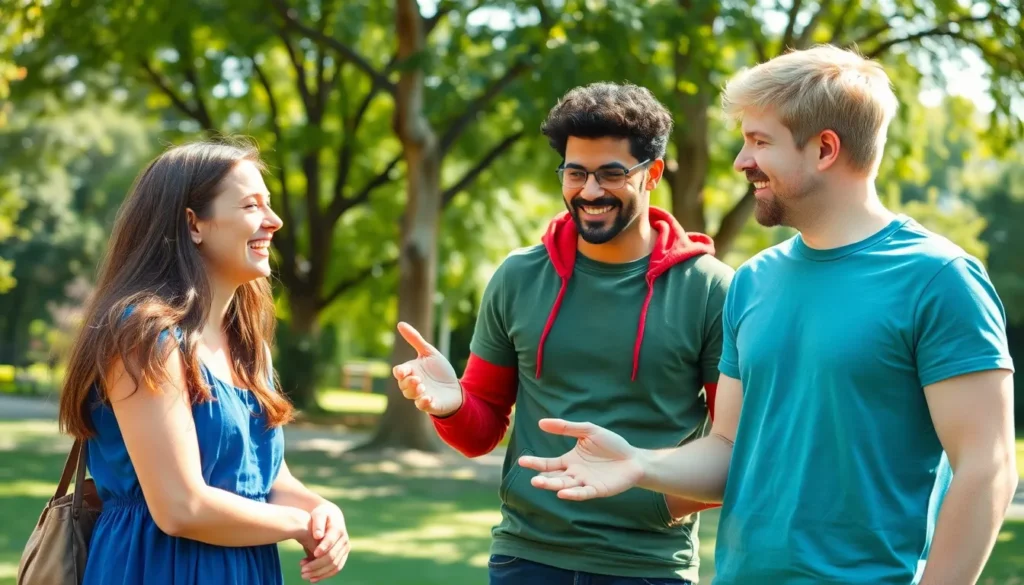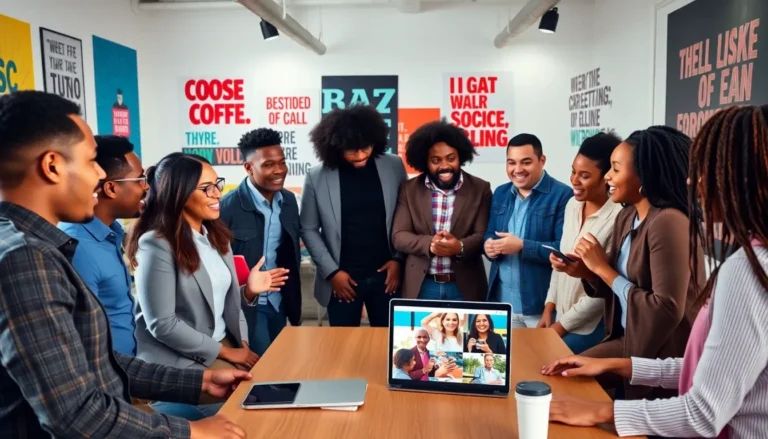Friendship is like a fine art—some people have a natural talent for it, while others need a little guidance. Imagine trying to paint a masterpiece with a roller brush; it just won’t cut it. Developing friendship skills isn’t just about knowing how to share your last slice of pizza (though that helps). It’s about building connections that stand the test of time and awkward moments.
In a world that often feels more connected yet lonelier than ever, mastering friendship skills can be your secret weapon. Whether it’s navigating the tricky waters of group chats or knowing when to offer a shoulder to cry on, these skills can transform casual acquaintances into lifelong pals. So grab your metaphorical paintbrush, and let’s dive into the colorful world of friendship skills that can brighten anyone’s social canvas.
Table of Contents
ToggleUnderstanding Friendship Skills
Developing friendship skills involves essential interpersonal abilities that foster meaningful connections. Learning these skills enhances social interactions and creates supportive networks.
Importance of Friendship Skills
Friendship skills play a crucial role in emotional well-being. They contribute significantly to overall happiness and life satisfaction. Building strong bonds with others can reduce feelings of loneliness. Engaging with friends offers emotional support during challenging times. Positive friendships enhance mental health, decreasing anxiety and depression. These interactions create a sense of belonging and boost self-esteem. Ultimately, strong friendships make life’s journey more enjoyable.
Key Components of Friendship Skills
Key components of friendship skills include effective communication, active listening, and empathy. Active listening demonstrates genuine interest in others’ thoughts and feelings. Expressing oneself clearly fosters understanding and connection. Empathy allows individuals to relate to the experiences of others. Trust and reliability strengthen bonds, encouraging deeper relationships. Conflict resolution skills help navigate misunderstandings and maintain harmony. Regularly showing appreciation reinforces positive interactions, solidifying friendships over time. Developing these skills enriches social lives and nurtures lasting connections.
Developing Friendship Skills

Developing friendship skills enhances the ability to create meaningful connections. Skills like communication and active listening form the foundation of nurturing relationships.
Communication Techniques
Clear communication serves as the cornerstone of effective friendships. Using direct language fosters understanding. Non-verbal cues play a pivotal role in conveying feelings and intentions. Additionally, sharing thoughts and experiences deepens bonds. Engaging in open dialogue encourages trust and vulnerability. Simple gestures, like maintaining eye contact, reinforce connection. Tailoring conversations to the other person’s interests keeps interactions lively and relevant. Frequent check-ins can also show genuine care, strengthening the relationship.
Active Listening Strategies
Active listening elevates the quality of interactions. Focusing entirely on the speaker promotes a sense of importance. Restating what has been said demonstrates understanding and attentiveness. Asking clarifying questions invites deeper exploration of thoughts and feelings. Summarizing key points shows investment in the conversation. Maintaining an open body posture creates a welcoming atmosphere. Responding with empathy can provide emotional support, reinforcing the friendship. Setting aside distractions enhances the experience, enabling meaningful exchanges. Developing these strategies leads to stronger interpersonal connections.
Nurturing Friendships
Nurturing friendships involves ongoing efforts to strengthen bonds. Developing trust and respect creates a solid foundation for any relationship.
Building Trust and Respect
Trust forms the cornerstone of lasting friendships. It’s earned through consistent actions and honesty. Respecting each other’s boundaries fosters a safe environment for open communication. A friend who shows appreciation for unique perspectives builds mutual respect. Sharing personal experiences can deepen the connection. When individuals follow through on promises, it reinforces trustworthiness. Open discussions about feelings contribute to a stronger, more trusting friendship. As both parties prioritize transparency, the relationship becomes more resilient.
Handling Conflicts Effectively
Conflicts are inevitable in any friendship. When disagreements arise, addressing them promptly prevents simmering resentment. Open dialogues allow friends to express concerns without fear of judgment. Each person should listen actively, ensuring both sides feel heard. Finding common ground often leads to creative solutions. Staying calm during heated moments helps maintain respect. Acknowledging mistakes can also diffuse tension. Ultimately, resolving conflicts strengthens friendships by enhancing understanding and deepening bonds. By embracing conflict as an opportunity for growth, individuals foster more resilient, fulfilling relationships.
The Role of Emotional Intelligence
Emotional intelligence plays a vital role in cultivating successful friendships. It involves recognizing one’s emotions and those of others, which fosters deeper connections.
Empathy in Friendships
Empathy enhances understanding among friends. This means grasping feelings and perspectives, leading to genuine support. They can connect better when individuals show empathy during tough times. Validating each other’s emotions creates a safe space for sharing. Demonstrating compassion and consideration strengthens bonds, making friendships more resilient. Empathetic individuals often feel more fulfilled and invested in their relationships.
Navigating Social Situations
Navigating social situations requires emotional intelligence. Assessing others’ feelings helps tailor interactions effectively. By observing body language and tone, individuals can adapt their responses to meet social dynamics. They can approach new environments with confidence, making introductions easier and more enjoyable. Skills like initiating small talk or knowing when to listen contribute to better connection. Successful navigation of social scenarios promotes inclusivity, fostering a sense of belonging among friends.
Mastering friendship skills is essential for creating meaningful and lasting connections. These skills not only enhance social interactions but also significantly contribute to emotional well-being and overall happiness. By focusing on effective communication, active listening, and empathy, individuals can transform casual acquaintances into deeper relationships.
Nurturing friendships requires ongoing effort and a commitment to building trust and respect. Embracing conflict as an opportunity for growth can lead to stronger bonds and a greater understanding of one another. As individuals invest time and energy into developing these skills, they’ll find that the rewards of friendship enrich their lives in countless ways.










